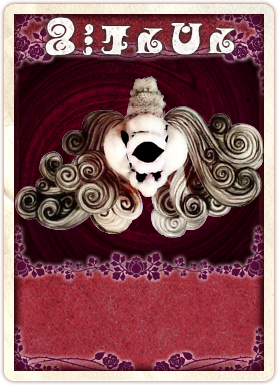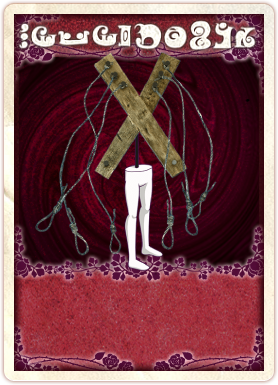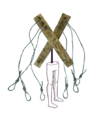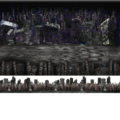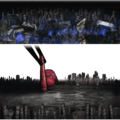Oshiti: Difference between revisions
Mokyubacky (talk | contribs) m (→References) |
Mokyubacky (talk | contribs) (→Trivia) |
||
| Line 34: | Line 34: | ||
*In the anime, it was unclear if Oshiti is the witch's name, or simply a word used in its labyrinth; later in the same episode, [[Raspberry|Raspberry's]] name is clearly presented both on the entrance to its labyrinth and behind the witch when it attacks Yachiyo, where no such runes are given to this witch. | *In the anime, it was unclear if Oshiti is the witch's name, or simply a word used in its labyrinth; later in the same episode, [[Raspberry|Raspberry's]] name is clearly presented both on the entrance to its labyrinth and behind the witch when it attacks Yachiyo, where no such runes are given to this witch. | ||
** Its name was confirmed to be Oshiti when it was added to the game. | ** Its name was confirmed to be Oshiti when it was added to the game. | ||
===about Yaoya Oshichi=== | |||
Oshiti is likely named after [[wikipedia:Yaoya Oshichi | Yaoya Oshichi]], a girl regarded as the tragedy's heroine attempted arson for love and executed by burning. Although she was probably a real person in 1680s Japan, little is known with historical certainty about her. However, her tragic story has became the subject of many literary works and plays, and has been interpreted and adapted in many ways. | |||
* Oshiti is likely named after [https://en.m.wikipedia.org/wiki/Yaoya_Oshichi Yaoya Oshichi], a young girl in 1600's Japan that was executed via burning at the stake at Suzugamori for arson. She once fell in love with a temple page during a great fire in the Tenna Era, and attempted arson the following year, believing she could meet him again if another fire occured. At the time, however, minors (those fifteen years or younger) could not be given the death penalty, and so a magistrate, hoping to absolve her, asked her age twice; both times, she misunderstood his intentions, and falsely gave her age as sixteen, and the magistrate had no choice but to have her executed. In the calendar then used in Japan, a year is known by five elements, and one of 12 animals. Oshichi was born in 1666, the year of the fire horse. | * Oshiti is likely named after [https://en.m.wikipedia.org/wiki/Yaoya_Oshichi Yaoya Oshichi], a young girl in 1600's Japan that was executed via burning at the stake at Suzugamori for arson. She once fell in love with a temple page during a great fire in the Tenna Era, and attempted arson the following year, believing she could meet him again if another fire occured. At the time, however, minors (those fifteen years or younger) could not be given the death penalty, and so a magistrate, hoping to absolve her, asked her age twice; both times, she misunderstood his intentions, and falsely gave her age as sixteen, and the magistrate had no choice but to have her executed. In the calendar then used in Japan, a year is known by five elements, and one of 12 animals. Oshichi was born in 1666, the year of the fire horse. | ||
** It's likely that this witch is based on the novel ''Five Women Who Loved Love'', which features Yaoya Oshichi, as its nature is an idiom referencing the book. Interestingly, Mifuyu mentions having read it in her in-game quotes. | ** It's likely that this witch is based on the novel ''Five Women Who Loved Love'', which features Yaoya Oshichi, as its nature is an idiom referencing the book. Interestingly, Mifuyu mentions having read it in her in-game quotes. | ||
** These elements all likely reference both the fire in Oshiti's labyrinth, and, possibly, Yachiyo's attempts to reunite with Mifuyu through the use of the Mizuna Shrine Uwasa, guarded by the Uwasa of the ''Commoner's Horse''. | ** These elements all likely reference both the fire in Oshiti's labyrinth, and, possibly, Yachiyo's attempts to reunite with Mifuyu through the use of the Mizuna Shrine Uwasa, guarded by the Uwasa of the ''Commoner's Horse''. | ||
* The [https://en.wikipedia.org/wiki/Suzugamori_execution_grounds Suzugamori execution grounds] were one of many sites where Tokugawa shogunate executed criminals ,anti-government conspirators and Christians during the Edo period. Criminals were executed on the outskirts of the city to avoid the "spiritual pollution" of the city. During the time, Suzugamori was on Tokyo Bay, where criminals were also executed; those executed at the bay were suspended upside-down and drowned when the tide rose. A few remnants are still on the site. Among them are a well, an iron post for execution by burning, and a stone base for erecting wooden pillars for crucifixion. | * The [https://en.wikipedia.org/wiki/Suzugamori_execution_grounds Suzugamori execution grounds] were one of many sites where Tokugawa shogunate executed criminals ,anti-government conspirators and Christians during the Edo period. Criminals were executed on the outskirts of the city to avoid the "spiritual pollution" of the city. During the time, Suzugamori was on Tokyo Bay, where criminals were also executed; those executed at the bay were suspended upside-down and drowned when the tide rose. A few remnants are still on the site. Among them are a well, an iron post for execution by burning, and a stone base for erecting wooden pillars for crucifixion. | ||
==Gallery== | ==Gallery== | ||
Revision as of 15:25, 23 November 2020
Oshiti (OSHITI) is a witch that appears in the twelfth episode of the Magia Record Anime. It was shown in a flashback fighting against Yachiyo Nanami's team prior to Kanae Yukino's death and was defeated.
This witch was initially exclusive to the anime, but later appeared in the game in the Deliver to the Beyond, A Piece of Hope event.
Witch
A witch convicted of sin, who has been reduced to only a head and suspended upside-down. Upon finding a human who has wandered into her Labyrinth, she insistently attempts to appeal to them about something, but her voice is emitted as rays of heat that burn her surroundings to ash. She is apparently waiting for someone while suspended, but even if that someone were to enter the Labyrinth, they would surely meet the fate of being turned to ash by the witch’s voice. The graveyards crowding the witch’s Labyrinth are piled high with gravestones: one stone for each sin the witch has committed, and for each lingering regret of an innocent. | |||||||||||
Minions
Minions that exist to punish their sinful witch. Though they all worked together to string the witch up, they’re apparently dissatisfied with the fact that she’s just a head, and are searching for her torso. They and the witch display excellent teamwork, as the minions capture intruders and the witch incinerates them with her screams, but they’re not doing it intentionally. The minions are frequently caught in the witch’s appeals and incinerated as well. Sometimes, they venture outside the Labyrinth to select people, objects or animals that could serve as the witch’s torso, but they’re apparently not the type to particularly care about whether the size matches. It’s the vibe that’s important. | |||||||||||
Trivia
- In the anime, it was unclear if Oshiti is the witch's name, or simply a word used in its labyrinth; later in the same episode, Raspberry's name is clearly presented both on the entrance to its labyrinth and behind the witch when it attacks Yachiyo, where no such runes are given to this witch.
- Its name was confirmed to be Oshiti when it was added to the game.
about Yaoya Oshichi
Oshiti is likely named after Yaoya Oshichi, a girl regarded as the tragedy's heroine attempted arson for love and executed by burning. Although she was probably a real person in 1680s Japan, little is known with historical certainty about her. However, her tragic story has became the subject of many literary works and plays, and has been interpreted and adapted in many ways.
- Oshiti is likely named after Yaoya Oshichi, a young girl in 1600's Japan that was executed via burning at the stake at Suzugamori for arson. She once fell in love with a temple page during a great fire in the Tenna Era, and attempted arson the following year, believing she could meet him again if another fire occured. At the time, however, minors (those fifteen years or younger) could not be given the death penalty, and so a magistrate, hoping to absolve her, asked her age twice; both times, she misunderstood his intentions, and falsely gave her age as sixteen, and the magistrate had no choice but to have her executed. In the calendar then used in Japan, a year is known by five elements, and one of 12 animals. Oshichi was born in 1666, the year of the fire horse.
- It's likely that this witch is based on the novel Five Women Who Loved Love, which features Yaoya Oshichi, as its nature is an idiom referencing the book. Interestingly, Mifuyu mentions having read it in her in-game quotes.
- These elements all likely reference both the fire in Oshiti's labyrinth, and, possibly, Yachiyo's attempts to reunite with Mifuyu through the use of the Mizuna Shrine Uwasa, guarded by the Uwasa of the Commoner's Horse.
- The Suzugamori execution grounds were one of many sites where Tokugawa shogunate executed criminals ,anti-government conspirators and Christians during the Edo period. Criminals were executed on the outskirts of the city to avoid the "spiritual pollution" of the city. During the time, Suzugamori was on Tokyo Bay, where criminals were also executed; those executed at the bay were suspended upside-down and drowned when the tide rose. A few remnants are still on the site. Among them are a well, an iron post for execution by burning, and a stone base for erecting wooden pillars for crucifixion.
Gallery
In the Game
In the Anime
Barrier
See Also
References
- ↑ Gokumon(獄門)is literally means "gate of jail" or a name of Japanese death penalty in Edo period. In this execution method, the criminal was beheaded and then the severed head was gibbeted.
- ↑ The term used for the witch's nature is 袖絞, literally means "to squeeze sleeves". It is a Japanese idiom meaning to cry hard for grief. This translation was quoted from here
